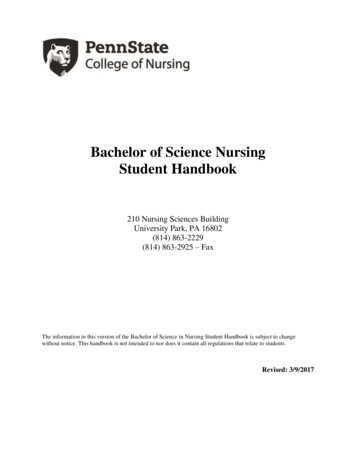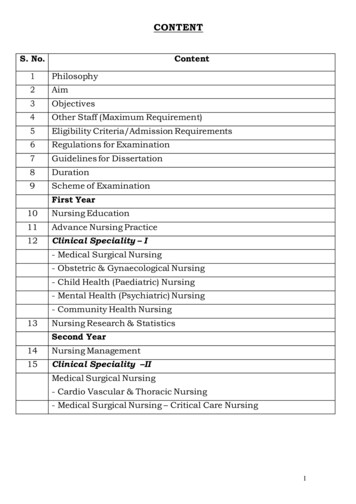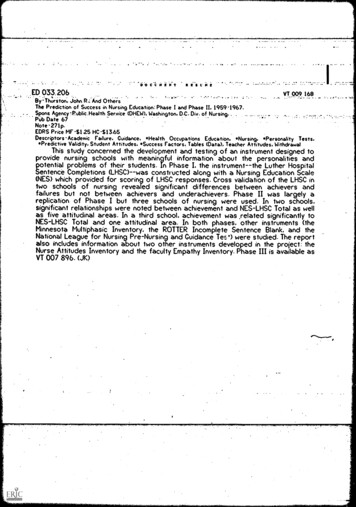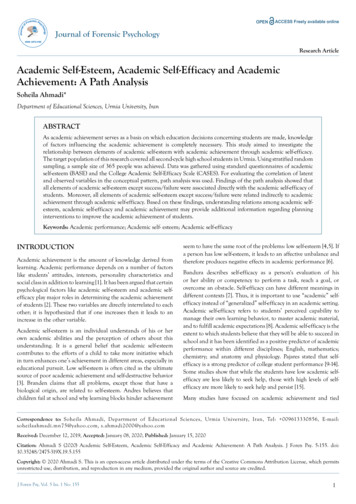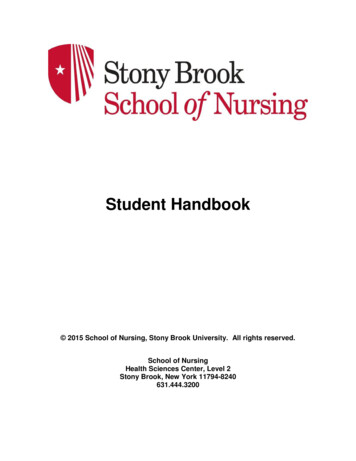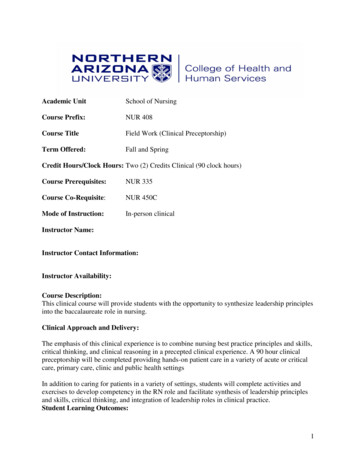
Transcription
Academic UnitSchool of NursingCourse Prefix:NUR 408Course TitleField Work (Clinical Preceptorship)Term Offered:Fall and SpringCredit Hours/Clock Hours: Two (2) Credits Clinical (90 clock hours)Course Prerequisites:NUR 335Course Co-Requisite:NUR 450CMode of Instruction:In-person clinicalInstructor Name:Instructor Contact Information:Instructor Availability:Course Description:This clinical course will provide students with the opportunity to synthesize leadership principlesinto the baccalaureate role in nursing.Clinical Approach and Delivery:The emphasis of this clinical experience is to combine nursing best practice principles and skills,critical thinking, and clinical reasoning in a precepted clinical experience. A 90 hour clinicalpreceptorship will be completed providing hands-on patient care in a variety of acute or criticalcare, primary care, clinic and public health settingsIn addition to caring for patients in a variety of settings, students will complete activities andexercises to develop competency in the RN role and facilitate synthesis of leadership principlesand skills, critical thinking, and integration of leadership roles in clinical practice.Student Learning Outcomes:1
Upon completion of this course, the successful student:Clinical Practice and Prevention Integrates theory, evidence, professional perspectives, and patient preferences into clinicaljudgment to provide holistic patient-centered care across the lifespan and healthcarecontinuum, and in healthcare environments. Synthesizes theory and evidence-based research in the direct and indirect delivery of carewithin professional practice.Communication Incorporates effective communication into professional nursing practice.Critical Reasoning Synthesizes evidence and nursing knowledge to evaluate and modify clinical nursingpractice, in order to provide holistic, safe, comprehensive, patient-centered care. Integrates reliable evidence from multiple ways of knowing to inform practice and makeclinical judgments.Leadership Integrates knowledge and skills in leadership, quality improvement, health care policy andpatient safety into practice to provide high quality care.Professionalism and Professional Values Integrates professional values and their associated behaviors into the practice of nursing. Incorporates ethical and legal principles and professional standards into nursing practice. Integrates caring’s affective characteristics into patient-centered care and with otherhealthcare professionals.Global Health Synthesizes principles of health equity and social justice for vulnerable populations into therole of the professional nurse. Analyzes the role of the nurse as change agent related to improving local and globalenvironmental conditions which affect a population’s health.Course Textbooks and Readings:Required Textbooks:American Psychological Association. (2009). Publication manual of the American PsychologicalAssociation (6th ed.). American Psychological Association: Washington, DC.NAU Accelerated Preceptor Handbook:This resource may be found on the Blackboard Learn course homepage in MS Word and PDFformats.ANA Code of Ethics:Reading to be completed prior to starting the preceptorship. Document can be found linked onthe course content page on the Blackboard Learn website.Recommended Reference Textbooks:Students are encouraged to use any appropriate nursing reference textbooks from previousnursing courses, less than 5 years old, including pathophysiology, medical-surgical, nursingdiagnosis, drug, nursing intervention, nursing outcome and laboratory value references.2
Emergency Textbook Loan Program:To help students acquire the materials they need to be successful in class, NAU has partneredwith Follett to create the Emergency Textbook Loan program. The program is administered bythe LEADS Center. The program assists students with unmet financial need in obtaining requiredtextbook(s) and other materials for courses. Students must apply and meet eligibility criteriabefore textbooks are purchased on their behalf. Textbooks must be returned at the end of theterm in which the textbooks were loaned. More information can be found rogram/Assessment of Student LearningWeighting of course activities and calculation of grade is as follows:Evaluation Tool/Assignment/Learning OutcomesPointsPre-Clinical Assessments: Successful completion of skills check off,Kaplan competency quizzes, portfolio up to date.10Clinical Documentation Incorporates effective communication into professional nursingpractice.Integrates professional values and their associated behaviors into thepractice of nursing.Incorporates ethical and legal principles and professional standards intonursing practice.Clinical Journals 1050All course outcomesEvaluations: Self, Preceptor, and Faculty Integrates knowledge and skills in leadership, quality improvement,health care policy and patient safety into practice to provide highquality care. Integrates professional values and their associated behaviors into thepractice of nursing. Incorporates ethical and legal principles and professional standards intonursing practice.Clinical Hours Completion 30P/FAll course outcomesTotal1003
Grading ScaleUsing the NAU School of Nursing grading scale, grades will be calculated as follows:93-100 points A (93%-100%)84-92 points B (84%-92%)78-83 points C (78%-83%)77 points and below F; must repeat course. Points are not rounded up in this course.The clinical portion of your grade will be determined based upon successful completion of theclinical hours and the following:a. Clinical Experience: Students will perform the 90 clinical hours in the clinicalpreceptorship. These hours will be performed in one of a variety of settings to facilitateexperience in the registered nurse role. Successful completion of the preceptorship hoursand passing the final clinical evaluation will indicate successful completion of the clinicalexperience.b. Nursing care: The clinical instructor will be assessing for growth in skills andknowledge throughout the semester. Your assessment, planning, implementation, andevaluation of nursing care will be self, preceptor, and instructor-evaluated each week andperiodically during the semester. If your nursing care is not deemed safe, the preceptorwill advise you and your instructors and written strategies for improvement of yournursing care will be developed. Failure to improve identified areas of concern can resultin failure of the clinical component of NUR 408. This means that if your preceptor orinstructor provides feedback about your performance, you are expected to make thechanges AND maintain an improved level of performance for the duration of thesemester.c. Professionalism: Professional behavior is expected in all aspects of NUR 408.Professionalism includes behaviors addressed in the NUR 408 course syllabus, all stateand federal laws in higher education, American Nurses’ Association Code of Ethics, theArizona State Board of Nursing guidelines, the NAU School of Nursing UndergraduateStudent Handbook (current edition) and the NAU Student Handbook (current edition).PLEASE NOTEThe initial online and in-person clinical assessments, including course orientation, the healthcareagency orientation, and required regulatory modules must be completed at the time the activitieshave been scheduled. There will be no makeup arrangements. If the student does notsuccessfully pass/attend/complete all of the requirements in preparation for the preceptoredclinical experience, it will not be possible to continue in this course.4
General Course PoliciesImportant Notice: There is strict adherence to every part of the NAU Student Handbookand the School of Nursing Undergraduate Student Handbook . The student is also responsiblefor review and adherence to the professional standards and rules of the Arizona Nurse PracticeAct and Board of Nursing, and the American Nurses’ Association Code of Ethics.1. NUR 408 is a rigorous academic course. Therefore, it is essential that students communicatewith the professor or the teaching assistant if difficulties arise.2. Each student is accountable and responsible for knowledge and skills obtained in prerequisitecourses.3. Each student is expected to complete all readings, all assignments and participate indiscussions. Readings in Blackboard Learn are meant to supplement and clarify the text andare not meant to replace textbook readings.4. All papers must be written in the American Psychological Association (APA) format usingthe 6th edition (typewritten, double-spaced, reference citations, etc.).5. Microsoft Word is the required word processing program for sending papers asattachments. Submit papers through the links provided on the Course Content page withineach module. Please do not submit .PDF documents. Name documents in the followingformat: Lastname Paper # (example: Watkins Paper1).6. There will be a 10% reduction for each day that assignments are late.7. Late assignments will not be accepted unless prior arrangements have been made withthe instructor.8. The NAU academic integrity policy is strictly adhered to in NUR 450C.9. All assignments are to be completed by each student individually without the help of othersunless specifically identified as a group project or the student has been directed to seek helpfrom a designated NAU tutor or teaching assistant.10. Wikipedia is not considered an acceptable, valid, or reliable resource for use in any School ofNursing coursework. One purpose of this course is to help students identify, appraise, andutilize valid and reliable professional resources. Wikipedia does not meet these criteria.11. Papers and assignments over the page limit will cause an automatic reduction in the grade.The reduction will be based on the content covered outside the page limit.12. The syllabus is subject to change only with advance notice and in accordance with NAUpolicies.5
Communication:It is important that each student maintains regular contact with the instructor throughout thecourse via the BbLearn course messages to enhance ongoing communication. Faculty willrespond within two (2) business days through course messages unless otherwise notified byfaculty. Professional communication and proper netiquette is expected in all messages,discussions, and assignments. Please see the NAU Classroom Disruption Policy and theNetiquette Home Page for more information.Confidentiality Statement:Students must maintain client confidentiality at all times in accordance with HIPPA, FERPA,legal, institutional, professional and ethical standards. No discussion regarding patients isacceptable outside the classroom or healthcare setting.Client records must not be photocopied under ANY circumstance. You may not remove from thehealthcare organization ANY part of the medical record. Failure to adhere to this policy mayresult in removal from the practicum experience, the course, and/or SON disciplinary action.Academic Dishonesty/Plagiarism:All forms of student academic dishonesty, including cheating, fabrication, facilitating academicdishonesty and plagiarism are prohibited and subject to disciplinary action. Cheating meansintentionally using or attempting to use unauthorized materials, information or study aids in anyacademic exercise. Fabrication means intentional and unauthorized falsification or invention ofany information or citation in an academic exercise. Plagiarism means intentionally orknowingly representing the words or ideas of another, as one's own in any academic exercise.For further explanation of academic dishonesty refer to the School of Nursing UndergraduateStudent Handbook and Northern Arizona University Student Handbook.University PoliciesReview the following policies available on the Northern Arizona University Policy Statementwebsite http://nau.edu/OCLDAA/ Forms/UCC/SyllabusPolicyStmts2-2014/:1. Safe Environment Policy2. Students with Disabilities Policy3. Academic Contact Hour Policy4. Academic Integrity Policy (also ACADEMIC%20DISHONESTY.pdf)5. Research Integrity Policy6. Sensitive Course Materials Policy7. Classroom Disruption Policy (also A Sites/Folder Templates/ Forms/Classroom Disruption Policy.pdf)6
NUR 408 COURSE POLICIESAssignments and course paperwork must be submitted, on time, as designated. Submissiondeadlines will be published in BbLearn shell. Students must submit their clinical work scheduleto the clinical instructor on the due dates as indicated. The instructor must be informed of anyplanned or unplanned schedule changes as soon as possible. Failure to do this can indicatefailure to meet course learning outcomes related to accountability and professionalism. At her orhis discretion, the instructor may: Remove the student from the clinical setting immediately. Conduct a counseling session with the student to develop an improvement plan. Reinstate access to the clinical setting. Monitor the student’s performance improvement status1.REQUIRED DOCUMENTATION FOR THE CLINICAL AGENCYIn keeping with the NAU School of Nursing policy and the clinical agencies' requirements,no student will be allowed to attend a clinical experience until documentation of currency forall mandatory clinical requirements is on file in the administrative office. Unmetdocumentation requirements may result in an Administrative “drop”, with fees incurred to reenroll. You may be required by the clinical site to meet additional requirements, such asdrug testing, vaccinations, blood tests or background checks. Current clinical documentationmust be provided BEFORE the first day of class. No current clinical documentation noclinical orientation failure in NUR 408.2.a.b.c.d.e.f.POLICIES RELATED TO STUDENT RESPONSIBILITIESAll health, safety, and agency documentation must be current.Attendance at clinical is mandatory.Student must report tardiness, or absences.Student must adhere to all AZBN, NAU, SON policies.Falsification of documentation will result in course failure.Maintain patient confidentiality at all times.3.MANDATORY SITE SPECIFIC CLINICAL EDUCATIONStudents must complete and pass any educational or skill requirements training required bythe individual clinical sites, which may include computerized charting, orientation, andinfection control and safety training.4.NURSING SUPPLIESAs part of being prepared for clinical, students must bring all of the following supplies to theunit daily: bandage scissors, stethoscope, pen, penlight, a watch with a second hand.5.ATTENDANCE AND TIMELINESSa. Sites for clinical preceptorships are negotiated and assigned to individual students. Dueto limited availability of clinical sites and to improve the variety of clinical experiences,students will need to be flexible, plan to travel to outlying communities and work in oneof a variety of clinical settings, on different days of the week. No changes may be made7
b.c.d.e.f.6.to the clinical site, agency, unit, nurse, or shift without express written permission fromthe clinical placement coordinator.Students are expected to be in the clinical area during the hours they negotiated with theirpreceptor unless severely ill and/or contagious, or if there has been a catastrophic lifeevent. Missing clinical hours, unless sick or for an emergent event, is stronglydiscouraged as it may jeopardize completion of clinical experience.In the case of illness, family emergency, or some other catastrophic problem that willdelay your arrival or prevent you from attending ANY clinical, AT LEAST TWOHOURS BEFORE THE START OF YOUR SHIFT, you must notify your preceptor andnursing unit, in accordance with hospital policy, and notify your clinical instructoraccording to their instructions. PLEASE, DO NOT USE E-MAIL.If a student is late to any clinical related session, (unless previously approved by yourpreceptor or instructor), you will be required to write a 3-page, pass/fail paper, with 5library references, addressing accountability, professionalism and how lack of timelinesscan impact patient care and your ability to meet clinical learning outcomes as set forth inthis course packet. The paper is due no later than seven days after it is assigned.Repeated tardiness is subject to failure in the clinical portion of NUR 408.Leaving the nursing unit: To insure adequate patient care in your absence, you need toinform your RN preceptor and receive her/his approval BEFORE leaving the nursing unitfor any reason. Students are not allowed to leave the healthcare agency for lunch ordinner unless there are no dining facilities available.If the preceptor leaves work prior to the end of the scheduled shift, the student must alsodepart, unless the preceptor identifies another qualified RN to whom the preceptor rolecan be delegated.CLINICAL HOURSa. For the purpose of this course, the clinical week will start at 0001 on Sundays and end at2400 on Saturdays.b. The students’ clinical hours will be the same hours as the nurse preceptor. At thediscretion of the NUR 408 clinical faculty the nursing student may be required to workthe night shift.c. Clinical hours may be completed on University Holidays with instructor approval.d. Students may not work more than:1. 40 hours in a clinical week2. 12 hours per working day, unless completing unexpected patient careresponsibilities.3. 3 twelve hour shifts in a rowe. The student will obtain the preceptor's work schedule and negotiate, in advance, the shiftson which the student will work. Unless approved by the clinical faculty in advance,students may not schedule themselves to work when their assigned preceptor is notscheduled to work. Unless severe illness or a catastrophic event has occurred, the studentmust work on the days she or he committed to work.f. Only completed, scheduled shift hours, not the time worked beyond those hours, can becredited toward the 90 preceptorship hours.8
7.PROFESSIONAL APPEARANCE IN THE CLINICAL SETTINGa. Dress code policies are implemented by the SON and individual institutions as part oftheir patient care, service and infection control environments.b. Strict adherence to the NAU School of Nursing dress code / OR agency dress code isrequired for any clinical setting. In case of discrepancy between the school and thehospital dress codes, the student will adhere to the more stringent dress code.c. The RN preceptor and clinical instructor are responsible for determining whether theprofessional appearance requirements have been met and her/his decision regarding thisis not negotiable. Failure to meet these standards will result in removal from the settingand repeated behaviors may place the student at risk for failure of the clinical portion ofthe course.8.CLINICAL ASSIGNMENTSa. Your preceptor will make patient assignments based on your learning and skills needsand learning outcomes.b. Identify your learning needs and objectives and collaborate with your preceptor tomaximize your educational experience.c. Your clinical time in the hospital is limited, so maximizing your opportunities forlearning is essential. You must notify your preceptor IMMEDIATELY if there is aproblem with your patient assignment, such as being discharged from the hospital, beingabsent from the floor for a prolonged period such as diagnostic testing or surgery, or yourpatient’s refusal to allow a student to care for him/her. Failure to notify your preceptor isgrounds for disciplinary action at the discretion of the preceptor and/or instructor.9.CELL PHONESa. Personal cell phones will be turned off during all clinical experiences. Any nonemergency cell phone use is not allowed during the clinical shift unless you are off thefloor, on break. If you expect an emergency call (such as a sick child or a pregnantspouse with impending labor), you must get your preceptor’s approval before you maycarry the phone, but it MUST be in vibrate mode.b. No personal cell phones with camera capacity are allowed in any patient care area at anytime.10.CONFIDENTIALITY STATEMENTa. Students must maintain client confidentiality at all times. No discussion regarding clientsis acceptable outside the classroom or clinical setting or in any setting where confidentialinformation can be overheard or seen by others. In the hospital, clinical conferences andin the virtual classroom, when communicating about actual client experiences, refer to theclient by their initials only.b. Client records are not to be photocopied under ANY circumstances.c. You may not remove from the clinical setting ANY part of a medical record.11.PROFESSIONAL COMMUNICATION, BEHAVIOR AND PROBLEM SOLVINGa. Students must be completely familiar with and follow all policies and proceduresregarding professional nursing conduct, ethics and fitness requirements, including state of9
b.c.d.e.f.Arizona, NAU Civility Statement, NAU student handbooks, NUR 450C/408, and ANArequirements.All NAU, School of Nursing and NUR 408 policies, including those covering civility,plagiarism, dishonesty, and unprofessional conduct, apply to the NUR 408 clinicalcourse.Incidents of uncivil behavior, unprofessional conduct and violations of confidentialityand professional conduct standards will not be tolerated, and reported immediately to theclinical instructor.As determined by the preceptor and clinical instructor, a student may be removed from aclinical setting for failure to comply with the standards, policies and procedures outlinedin the NUR 408 course materials and/or student handbooks (including appearance, arrivaltime, impairment, or inadequate preparation for the clinical experience), any unsafeclinical practice, uncivil behavior or any other violation of the above legal, professionaland academic standards of nursing practice, values or behavior.Removal from clinical for unsafe or unprofessional conduct will result in a referral to thecourse faculty for review and may constitute grounds for failure of the course and referralfor administrative review and action by appropriate School of Nursing administrator.Two or more unsafe or unprofessional conduct incidents will result in failure of thecourse.A student in violation of these standards for the first time will, at the discretion of theinstructors, receive one or any combination of the following: counseling a written warning meet with the course instructor/s and the student’s faculty advisor to develop aremedial plan to correct the behavior12.FEEDBACK AND CONSTRUCTIVE CRITICISMa. Nursing is a profession dedicated to the service of others, held in high esteem and trust bythe American public. During nursing school, the student will be socialized to thecomplex professional registered nursing role, practice, values, behaviors, skills andknowledge. As a nursing student, behavior and performance will be evaluated accordingto legal, professional and academic standards of care and conduct.b. Feedback and constructive criticism can be expected throughout the clinical experiences,from instructors, preceptors, and other colleagues and students. Feedback andconstructive criticism, both positive and negative, are objective and focused on behaviorswhich can be modified or corrected. Instructors and preceptors know that feedback ismost effective when provided as soon as possible after an event.13.SUPERVISION OF PROCEDURESa. Nursing skills acquisition: Use of the nursing skills checklists from prior nursing coursesmay provide guidelines for review for skills performance in the clinical setting. Discussthe skills related strengths and challenges with the preceptor and work together todetermine the most effective way to provide safe patient care and gain experience in theRN role. Any skill that has not been previously practiced with an actual patient anddetermined to be safely done, MUST be performed with the preceptor present. The10
preceptor working with the student will continue to observe and evaluate nursing skills tomonitor progression in skill competency.b. The nursing student should review the clinical agency’s nursing policies and proceduresand note practice guidelines and any practice restrictions for student nurses. YouCANNOT perform any acts prohibited by established course or hospital policies andprocedures. Doing so may result in immediate removal from the clinical and possibleexpulsion from the nursing program.11
Appendix – FORMS Student, and preceptor course acknowledgement forms, and contact information formsare included. Correct contact information is imperative for effective communication, andsafety. The clinical hours documentation form is an important form to maintain accuraterecords of the required clinical hours attended. This information is shared by thestudent, preceptor, and nursing instructor. Evaluation of the Preceptorship Program Evaluation forms of the clinical course are to be completed by the student, andpreceptor, and returned to the nursing faculty at the end of the clinical rotation. Theseevaluations assists the School of Nursing in making improvements in the program on anon-going basis.Student Incident Report Related to Clinical Experience The Student Incident Report Related to Clinical Experience form is completed by thestudent and the instructor and/or preceptor and forwarded to the course nursing facultyfor review and appropriate disposition. The form is filed in the student’s personal file instudent services.Guidelines related to skills performance:The skills list identifies, for the students and preceptor, which skills a student mayperform with direct supervision of the preceptor and which a student may not performunder any circumstances. Included are some specific reminders for the clinicalexperience.Course Acknowledgement FormPreceptor Agreement FormNursing Faculty Contact InformationPreceptor Contact FormClinical Hours FormEvaluation Form (Faculty/Preceptor)Evaluation Form (Student Self-eval)Performance Evaluation CriteriaPreceptor EvaluationAgency Evaluation – Available OnlinePreceptor’s Evaluation FormIncident Report FormsSkills Supervision Guidelines12
Student Acknowledgment FormNorthern Arizona University School Of NursingInstructions: Please fill in the information and submit via the NUR 408 BBLearn Assignment Drop Box.This information may be shared with the clinical healthcare agency.Student Name:I have read and understand the NUR 408 course materials for the current semester, including thesyllabus, policies, and assignments. I have also read and understand the NAU and School of NursingUndergraduate Student and Preceptor Handbooks (current versions). I agree to abide by the guidance,policies and expectations set forth in the course materials and the NAU and NAU School of NursingUndergraduate Student Handbooks.I have completed all clinical course requirements, and have provided the required documentation to theSchool of Nursing office, current through the end of this semester: MMR, TB, Hep B, Varicella,Rubella/Rubeola vaccinations, or proof of immunity, CPR certification, liability insurance, healthcareinsurance (current through the end of the semester). Proof of approved AZ fingerprinting backgroundcheck, as required by the state and many clinical agencies has been provided. Proof of urine drugscreening, and any other documentation required by specific clinical agencies in which I have beenassigned to work has been filed in the SON Student Services office.I understand how to communicate with course nursing faculty and acknowledge that it is myresponsibility as an adult learner to seek clarification and assistance when needed.I will abide by all mandated HIPPA and FERPA confidentiality guidelines during the capstone clinicalexperience.Signature (electronic is acceptable, name and user ID)(Date)Student Needs Questionnaire (mandatory)Submission of the questionnaire will help your instructors to facilitate your learning experience.What do you see as your strengths?What do you see as your challenges?What are your learning objectives for this course?How can the instructors/preceptors best assist you in the accomplishment of your objectives?Any other information that may be helpful for the faculty to know about your learning needs?13
Preceptor Agreement FormNorthern Arizona University School of NursingStudent Name: Semester:Preceptor Name and Agency:NAU Clinical Instructor:This agreement specifies the number of clinical hours required by the student in order to have theopportunity to successfully demonstrate NUR 408 course objectives.The student must complete the entire direct patient care hours required for completion of the NUR 408course. These hours are to be completed in the semester time frame agreeable to the preceptor, thestudent and the faculty.All clinical requirements will as directed, and need to be completed prior to last day of NUR 408. If, forsome reason, the clinical hours cannot be completed, a conference between the preceptor, nursingfaculty, and student will occur in order to successfully resolve any discrepancies. Documentation ofclinical hours is the responsibility of the student, with the preceptor verifying the time by signature.Upon completion of the required clinical hours, the Clinical Preceptorship Documentation form will beforwarded to the clinical course faculty. It is acknowledged that completion of clinical hours does notassure a passing grade for the course.The student has identified and discussed at least 6 specific, measurable learning objectives for thisexperience (excludes specific nursing skill acquisition):1.2.3.4.5.6.Student’s SignatureDatePreceptor’s SignatureDateFaculty’s SignatureDate14
NUR 408 Nursing Faculty Contact InformationNorthern Arizona University School of NursingOur course faculty will be contacting you regularly, to briefly discuss the student’s progress and anyconcerns or feedbac
Course Textbooks and Readings: Required Textbooks: American Psychological Association. (2009). Publication manual of the American Psychological Association. th(6 ed.). American Psychological Association: Washington, DC. NAU Accelerated Preceptor Handbook: This resource may be found on the Blackboard Learn course homepage in MS Word and PDF formats.




